|
|
|
Sort Order |
|
|
|
Items / Page
|
|
|
|
|
|
|
| Srl | Item |
| 1 |
ID:
100944
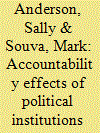

|
|
|
|
|
| Publication |
2010.
|
| Summary/Abstract |
Selectorate theory posits that leader accountability increases with the size of the winning coalition. Recent research contends that capitalism also increases leader accountability because leaders are more dependent on the public for revenue in more capitalist economies. The authors argue that extant tests of accountability arguments of interstate conflict initiation and targeting are flawed. Accountability theories of foreign policy expect leaders to selectively initiate disputes based on their probability of winning. Accountability arguments, then, expect a conditional relationship between the accountability mechanism and the balance of power. For example, if capitalism produces peace through accountability, then more capitalist states should be less likely to initiate militarized disputes as their power advantage decreases. The authors find that this is not the case. At the same time, the authors find robust support for selectorate theory's contention that larger winning coalitions are more selective about using military force. Political institutions induce accountability; capitalism does not.
|
|
|
|
|
|
|
|
|
|
|
|
|
|
|
|
| 2 |
ID:
149474


|
|
|
|
|
| Summary/Abstract |
The scientific study of war has largely ignored necessary conditions for war onset. Conflict scholars have previously identified alliances as a mechanism that brings about the initial expansion of war but have not examined whether it is a prerequisite for large wars. We argue that wars diffuse into multiparty wars only in the presence of alliances. In other words, in the absence of any alliance ties, war would not include more than two parties. We put forth a theoretical rationale for this relationship and conduct a series of tests on both dyadic and multiparty wars between 1816 and 2007. These tests provide support for our hypothesis, suggesting that alliances are a virtual necessary condition for multiparty wars: the larger the war, the more likely alliances are a necessary condition.
|
|
|
|
|
|
|
|
|
|
|
|
|
|
|
|
| 3 |
ID:
160488
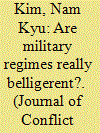

|
|
|
|
|
| Summary/Abstract |
Does military rule make a state more belligerent internationally? Several studies have recently established that military autocracies are more likely than civilian autocracies to deploy and use military force in pursuit of foreign policy objectives. I argue that military regimes are more likely to resort to military force because they are located in more hostile security environments, and not because they are inherently aggressive. First, I show that rule by military institution is more likely to emerge and exist in states facing external territorial threats. Second, by examining the relationship between military autocracies and conflict initiation, I find that once I control for states’ territorial threats, the statistical association between military regimes and conflict initiation disappears. Additionally, more evidence suggests that civilian dictatorships are more conflict-prone than their military counterparts when I account for unobserved dyad heterogeneity. The results are consistent across different measures of international conflict and authoritarian regimes.
|
|
|
|
|
|
|
|
|
|
|
|
|
|
|
|
| 4 |
ID:
186322
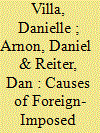

|
|
|
|
|
| Summary/Abstract |
Why do major powers attempt foreign-imposed regime change (FIRC)? This article builds on existing security theory, proposing that a major power looks for signals that a government might exit that major power’s international hierarchy and/or enter an adversary’s hierarchy. Major powers are more likely to attempt FIRC against states that signal shifting preferences. The article tests the theory on American FIRC attempts from 1947 to 1989, covert and overt, failed and successful, proposing that when a hierarchy member or neutral state engaged in economic expropriation, this signaled possible exit from the US hierarchy and/or entry into the Soviet hierarchy, making a US FIRC attempt against that state more likely. It also presents an alternative theory, that economic special interests drove US FIRC attempts. Using new data on expropriations, the article supports the security theory, as expropriations by US hierarchy members made FIRC attempts more likely, but does not support the special interests theory.
|
|
|
|
|
|
|
|
|
|
|
|
|
|
|
|
| 5 |
ID:
144797
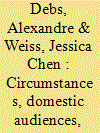

|
|
|
|
|
| Summary/Abstract |
We present a new theory of interstate crisis bargaining. A country’s resolve is a function of intrinsic qualities of the government and external circumstances, both of which are unknown by the domestic electorate and the foreign country. When domestic political debate reveals that circumstances favor the use of force, the government can extract better terms than if circumstances are revealed to be unfavorable. The revelation of circumstances, however, exacerbates reputational incentives. Because governments can no longer hide behind unknown circumstances, voters can better discern the government’s type from its actions, strengthening the incentives to appear resolved. The model bridges the gap between audience costs and its critiques, showing how domestic audiences punish leaders for inappropriate policies rather than empty threats. At the same time, it highlights how the prospects for peace are worse if uncertainty about the circumstances is removed, suggesting that greater transparency does not always promote peaceful outcomes.
|
|
|
|
|
|
|
|
|
|
|
|
|
|
|
|
| 6 |
ID:
173765
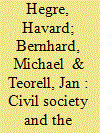

|
|
|
|
|
| Summary/Abstract |
We theorize that three distinct structures of democratic constraint explain why more democratic dyads do not engage in military conflict with each other. We build on earlier theories that focused on electoral and horizontal accountability. We add a new dimension—the social accountability provided by an active civil society. Using several new measures from the Varieties of Democracy (V-Dem) data set, we stringently test these explanations. We find social accountability to be the strongest and most consistent predictor of nonbelligerence in dyads, that horizontal accountability is still important, but that the independent role of electoral accountability has been somewhat overstated. However, we do find that social and electoral accountability work strongly together, to make for an even greater effect. The finding is robust to a range of specifications and in the face of controls for contending theories that challenge the democratic peace (e.g., the capitalist and territorial peace theories).
|
|
|
|
|
|
|
|
|
|
|
|
|
|
|
|
| 7 |
ID:
160783
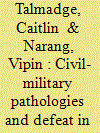

|
|
|
|
|
| Summary/Abstract |
This article uses an original data set, the Wartime Civil-military Relations Data Set, to test arguments about the causes of victory and defeat in war. Our analysis provides strong initial support for the notion that civil-military relations powerfully shape state prospects for victory and defeat. Specifically, states whose militaries have a significant internal role or whose regimes engage in coup-proofing appear to have a substantially lower probability of winning interstate wars, even when we account for the role of other important variables, including regime type and material capabilities. Crucially, our measures of civil-military relations include coup incidence but also move beyond it to detect more subtle indicators of civil-military relations. The resulting analysis should give us confidence in acknowledging the importance of nonmaterial variables in explaining war outcomes, while also paving the way for further research that can utilize and extend the data set.
|
|
|
|
|
|
|
|
|
|
|
|
|
|
|
|
| 8 |
ID:
177023
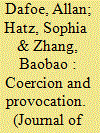

|
|
|
|
|
| Summary/Abstract |
Threats and force, by increasing expected costs, should reduce the target’s resolve. However, they often seem to increase resolve. We label this phenomenon provocation. We review instances of apparent provocation in interstate relations and offer a theory based on the logic of reputation and honor. We also consider alternative explanations: confounding or mis-imputation of resolve; revelation of information, character, or capabilities; or generalized sunk cost reasoning. Using survey experiments, we systematically evaluate whether provocation exists and what may account for it. We employ design-based causal inference techniques—a hypothetical natural experiment, a placebo treatment, and ruling out mediators—to evaluate our key hypotheses. We find strong evidence of provocation and suggestive evidence that it arises from considerations of honor, vengeance, and reputation. Our experimental design minimizes the risk that this result arises from our alternative explanations.
|
|
|
|
|
|
|
|
|
|
|
|
|
|
|
|
| 9 |
ID:
145693
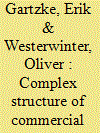

|
|
|
|
|
| Summary/Abstract |
Researchers continue to debate the impact of trade on interstate conflict. While many view trade as pacifying, others argue that dependencies increase friction and the risk of war. We provide a theory that explains how cross-border economic ties alternately enhance or impede international cooperation. Three main factors account for the heterogeneous effects of trade on conflict: interdependence, asymmetry, and multipolarity. Interdependence can act as a substitute for, or as a deterrent to, militarized violence. In the former case, interdependence actually increases more modest non-militarized conflict, while also discouraging militarized disputes. Asymmetry diminishes the conflict-inhibiting effect of trade ties, as dependency cannot simultaneously be used to coerce and to inform. Multilateral trade networks alternately moderate or enhance the bilateral effects of interdependence and asymmetry on interstate peace. Our theory and evidence reveal complex, cross-cutting consequences of economic interdependence on conflict behavior and also demonstrate effects well beyond the dyad, suggesting the need to include extradyadic ties in future theoretical and empirical research studying the commercial peace.
|
|
|
|
|
|
|
|
|
|
|
|
|
|
|
|
| 10 |
ID:
132321
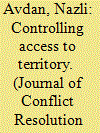

|
|
|
|
|
| Publication |
2014.
|
| Summary/Abstract |
Previous scholarship has largely failed to address the effect of economic interdependence on issue areas other than interstate conflict. This study seeks to redress this lacuna by focusing on states' visa policies and examining the impact of trade and capital interdependence in the context of transnational terrorism. The article argues that economic ties affect visa policies through a reconfiguration of preferences and the opportunity costs of economic loss and by tempering the impact of terrorism. To support this claim, the study conducts statistical analysis using directed dyad data on the visa policies of 207 states and independent political units. The article shows that the impact of economic interdependence is contingent on whether states are directly targeted in attacks of terrorism or face indirect threats from global terror. The study finds that economic incentives overwhelm security concerns when threats are indirect but have relatively limited influence, given threats against a state's own citizens or territory.
|
|
|
|
|
|
|
|
|
|
|
|
|
|
|
|
| 11 |
ID:
155061
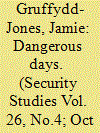

|
|
|
|
|
| Summary/Abstract |
Does an upsurge in nationalism make interstate conflict more likely? This article gives evidence to suggest that spikes in nationalism do have a direct impact on the likelihood of disputes between states. In it, I use national days or anniversaries as occasions that increase the salience of a national identity and its historical wars. I show that in the two months following national days, conflict is markedly higher than would be expected—almost 30 percent more likely than the rest of the year—and particularly likely for states who initiate conflict or who have revisionist intentions. I demonstrate further how nationalist sentiment can increase international tensions with a case study of national anniversaries in China and Japan. Together, this evidence suggests that the increase in nationalism around national days provides both risks and opportunities to regimes and shapes when they choose conflict over cooperation in international relations.
|
|
|
|
|
|
|
|
|
|
|
|
|
|
|
|
| 12 |
ID:
096120
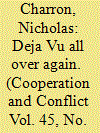

|
|
|
|
|
| Publication |
2010.
|
| Summary/Abstract |
Many in the media have depicted conflicts between the Western and Muslim worlds as a 'Clash of Civilizations' (CoC), and this has revived many of the questions surrounding the value of Samuel Huntington's CoC theory. Previous empirical tests have analysed his theory using low-level conflict at the interstate level or violent conflict at the subnational level. The former have demonstrated little or no empirical support for his theory, while the results in the latter group are mixed. This analysis adds to previous empirical studies in a number of ways. One, the empirical models test CoC exclusively in the post-Cold War era. Two, along with examining the civilizational determinants of military interstate disputes, as prior studies have done, I include models that focus exclusively on interstate wars, because Huntington frequently points out that a CoC between states will lead to violent political conflict. Finally, this study directly tests Huntington's civilizational 'fault lines' and Islamic 'bloody border' hypotheses. I include an extension and find that intra-civilizational conflict is relatively rare in the post-Cold War era. Contrary to earlier analyses, the data show strong empirical support for CoC, particularly when focusing on violent international conflict in the post-Cold War era, and the results are robust when testing the hypotheses with alternative data on international crises.
|
|
|
|
|
|
|
|
|
|
|
|
|
|
|
|
| 13 |
ID:
115202
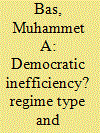

|
|
|
|
|
| Publication |
2012.
|
| Summary/Abstract |
This article examines the relationship between regime type and decision makers' tendency to make suboptimal choices in international crises. To test hypotheses on the optimality of democratic foreign policy, the author uses a novel statistical measure of suboptimality in foreign policy behavior. This estimator builds on Signorino's statistical strategic models to allow for actor-level variation in deviations from optimal behavior in a strategic setting. An analysis of the international disputes from 1919 to 1999 shows that democratic leaders have a greater tendency to choose policies not optimal for their citizens than do nondemocratic leaders.
|
|
|
|
|
|
|
|
|
|
|
|
|
|
|
|
| 14 |
ID:
128869
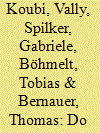

|
|
|
|
|
| Publication |
2014.
|
| Summary/Abstract |
This article reviews the existing theoretical arguments and empirical findings linking renewable and non-renewable natural resources to the onset, intensity, and duration of intrastate as well as interstate armed conflict. Renewable resources are supposedly connected to conflict via scarcity, while non-renewable resources are hypothesized to lead to conflict via resource abundance. Based upon our analysis of these two streams in the literature, it turns out that the empirical support for the resource scarcity argument is rather weak. However, the authors obtain some evidence that resource abundance is likely to be associated with conflict. The article concludes that further research should generate improved data on low-intensity forms of conflict as well as resource scarcity and abundance at subnational and international levels, and use more homogenous empirical designs to analyze these data. Such analyses should pay particular attention to interactive effects and endogeneity issues in the resource-conflict relationship.
|
|
|
|
|
|
|
|
|
|
|
|
|
|
|
|
| 15 |
ID:
109910
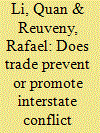

|
|
|
|
|
| Publication |
2011.
|
| Summary/Abstract |
Competing theories argue, respectively, that more trade reduces, increases, or does not affect interstate military conflict. We offer a new general theory on how trade affects conflict, which encompasses the liberal logic and the neo-Marxist/neo-mercantilist mechanism of asymmetric dependence and offers alternative explanations to the effects predicted by the bargaining and classical realist approaches. If a country expects its conflict toward a target to reduce the price of its import from or increase the price of its export to a target, it has an economic incentive to initiate conflict, and vice versa. These expectations can vary across trade flow directions and economic sectors. Using our model, we predict the effects of increases in exports and imports in five sectors on military conflict initiation. Statistical analysis of directed dyads from 1970 to 1997 largely supports our predictions. Rises in the initiator's imports of agriculture/fishery, energy, and chemical/mineral goods and exports of miscellaneous consumption goods reduce the likelihood of conflict initiation; rises in the initiator's exports of energy and both imports and exports of manufactured goods increase the likelihood. We evaluate implications for the literature and public policy.
|
|
|
|
|
|
|
|
|
|
|
|
|
|
|
|
| 16 |
ID:
192057
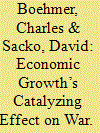

|
|
|
|
|
| Summary/Abstract |
This paper explains the circumstances where economic growth increases the likelihood of interstate war. Optimism created by high and sustained economic expansion permeates a state, increasing elite and mass optimism for the use of deadly force. Without relief, such unbridled sanguinity can lead states to war. However, other forces reduce the probability of war. Regional democracy, bilateral trade, and trade openness slow down the process where states go to war. This paper hypothesizes that key factors raise the temperature of disputes, increasing the likelihood of a political dispute combusting to war, while other attributes inhibit the process to war. Economic growth catalyzes such reactions, while regional and joint democracy impede the probability that a war sparks. This paper produces monadic and dyadic results demonstrating that economic growth increases the likelihood of war, while other factors such as interstate trade openness, bilateral trade, dyadic democracy, and regional democracy slow down the process of war, making war less likely.
|
|
|
|
|
|
|
|
|
|
|
|
|
|
|
|
| 17 |
ID:
114189
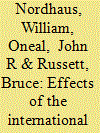

|
|
|
|
|
| Publication |
2012.
|
| Summary/Abstract |
We consider the influence of countries' external security environments on their military spending. We first estimate the ex ante probability that a country will become involved in a fatal militarized interstate dispute using a model of dyadic conflict that incorporates key elements of liberal and realist theories of international relations. We then estimate military spending as a function of the threat of armed interstate conflict and other influences: arms races, the defense expenditures of friendly countries, actual military conflict, democracy, civil war, and national economic output. In a panel of 165 countries, 1950 to 2000, we find our prospectively generated estimate of the external threat to be a powerful variable in explaining military spending. A 1 percentage point increase in the aggregate probability of a fatal militarized dispute, as predicted by our liberal-realist model, leads to a 3 percent increase in a country's military expenditures.
|
|
|
|
|
|
|
|
|
|
|
|
|
|
|
|
| 18 |
ID:
164167
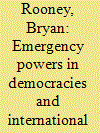

|
|
|
|
|
| Summary/Abstract |
Scholars argue that institutions in democracies constrain leaders and prevent international conflict. However, many democracies specify rules of governance in times of emergency that divert substantial power to the head of state. The manipulation of these “emergency powers” provides a rational motivation for conflict. Using a novel data set of emergency provisions within democracies, I test the relationship between emergency power strength and conflict propensity using several steps to achieve causal inference, including an instrumental variable analysis that exploits the specificity of the state’s constitution as a plausibly exogenous determinant of emergency power strength. I find that emergency power strength is a strong predictor of conflict onset in democracies in each test and that states with strong emergency powers are substantially more likely to enact a state of emergency due to an international conflict. I conclude with a discussion of my findings and avenues of future research using these data.
|
|
|
|
|
|
|
|
|
|
|
|
|
|
|
|
| 19 |
ID:
192532
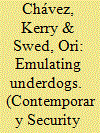

|
|
|
|
|
| Summary/Abstract |
Early studies on state drone proliferation argued that it would be temperate, constrained by high financial, technical, and infrastructural requisites and fielded according to the logic of scarce, exquisite airpower. While this rationale has held for limited conflicts, the high attrition and massive demand of a total war compelled strong standing armies to follow a different model of adoption: emulating weaker violent nonstate actors leveraging low-cost commercial platforms. The Russia-Ukraine war has captured this trend. Despite earlier expectations of armies maintaining advanced airpower for strategic ends, underdog Ukraine, followed by Russia have developed heavy reliance on commercial drone technologies for tactical aims. Framing this in military and battlefield innovation literature and drawing on studies on commercial drone use among violent nonstate actors, we argue that this constitutes a new trajectory involving mixed military arsenals enhanced with dual-use commercial platforms.
|
|
|
|
|
|
|
|
|
|
|
|
|
|
|
|
| 20 |
ID:
095025
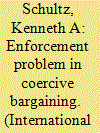

|
|
|
|
|
| Publication |
2010.
|
| Summary/Abstract |
This article explores the strategic problems that arise when a state seeks to use military force to compel changes in another state's policies. Although the costs associated with military action mean that there generally exist compromises that both sides prefer to conflict, bargaining may fail if such deals are not enforceable in the face of temptations to renege on policy concessions. This study develops a model that shows that inefficient conflict can occur when states bargain over policies that one of them can change unilaterally and covertly. I then show that this theory is useful for understanding a common source of international conflict: conflicts that arise when one state supports rebel groups engaged in a civil war with another state. Episodes of rebel support are associated with a substantial increase in the risk of interstate militarized disputes, the lethality of these disputes, and the likelihood of repeated violence. Agreements to limit rebel support are unlikely to reduce interstate violence unless they are coupled with concessions by the target state and/or monitoring mechanisms, both of which are shown theoretically to mitigate the enforcement problem.
|
|
|
|
|
|
|
|
|
|
|
|
|
|
|
|
|
|
|
|
|